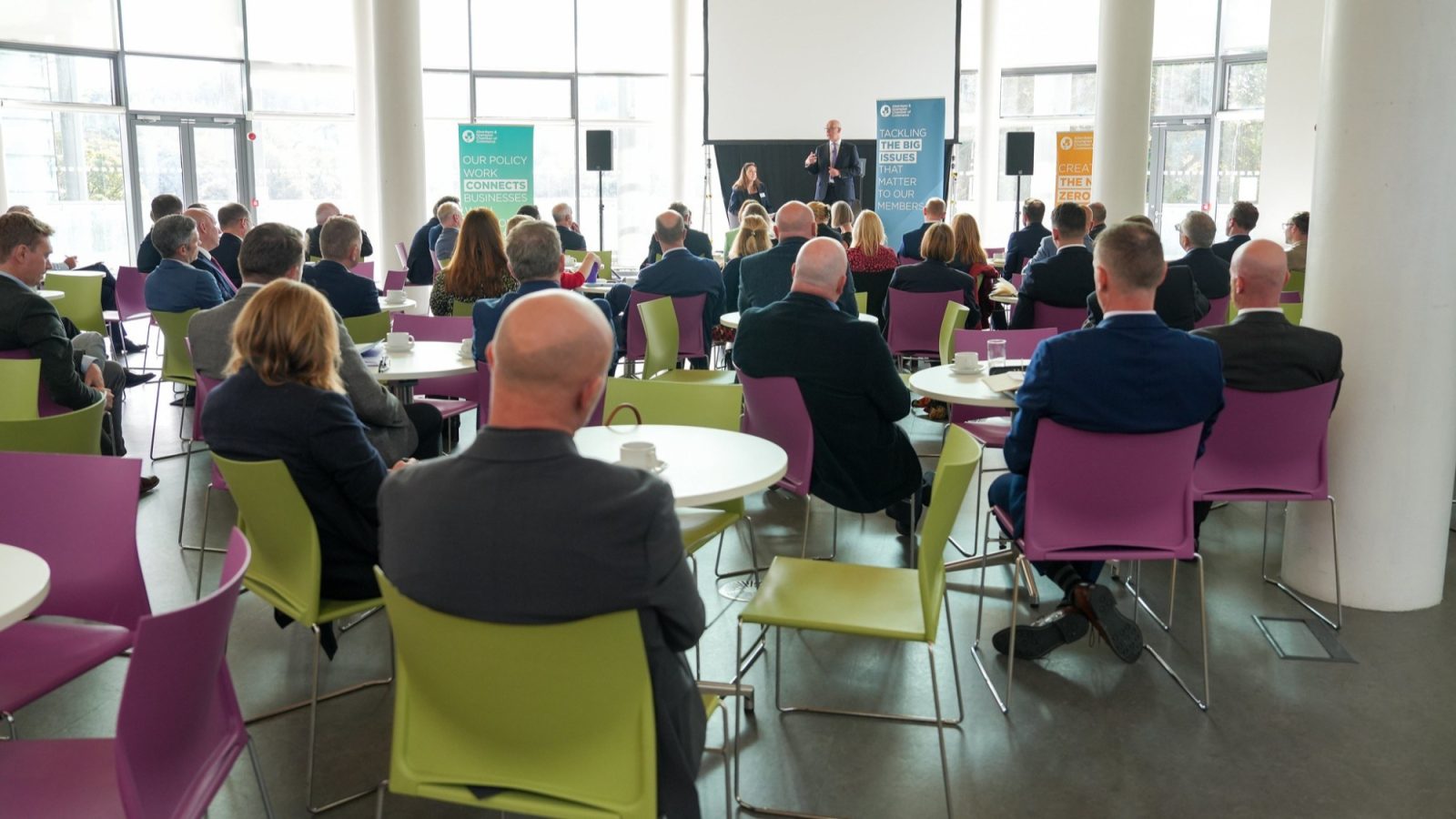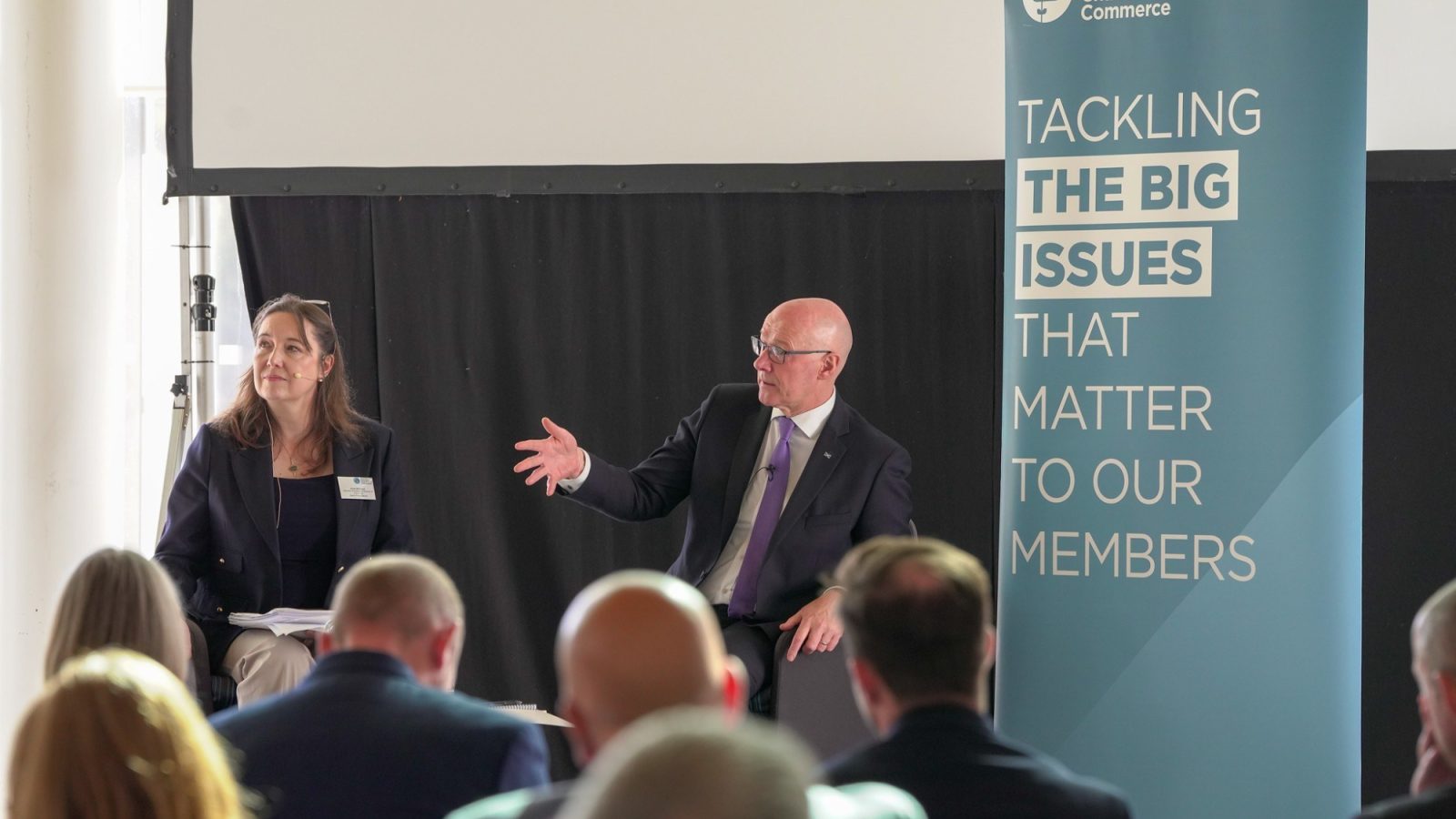First minister John Swinney has slammed the "absurd" planned axing of the STV North news programme, along with 60 jobs, at a roundtable Q&A with business leaders organised by AGCC.
The first minister was quizzed by business figures representing a range of sectors across the region during the event, which was held at Robert Gordon University on Monday.
Kirstin Gove, communications manager for Thistle Wind Partners and a former STV reporter, asked the first minister about the recently announced planned closure of STV North with the loss of 60 jobs.
She asked: “As the first minister, how do you plan to make sure that the north of Scotland maintains a strong, independent voice through quality journalism?”
Swinney replied: “I totally understand the concern there is in the north and North-east of Scotland on this.”
He explained there had been unanimous, cross-party concern at FMQs about the loss of the “distinctive news coverage” for the North-east, in addition to the job losses.
He continued: “There are so many distinctive issues and perspectives in the North-east of Scotland which I think stand to be lost by just one national output.
“I have to say, I find the decision really pretty absurd, because nowadays there is so much accessibility of technology.
“Journalists interviewing me now are doing so with flexible and dynamic equipment than they ever had in the past, they’ve got access to equipment to enable communication of that output so much more easily than ever before in the past.
“So why, at this moment, when all of that has been made easier by technology, are we going to a one-dimensional approach? Rationally, I don’t quite understand that.
“I think there’s a really strong case to be made there, and we will make it.
“I’ve had a letter from Aberdeen & Grampian Chamber of Commerce expressing these concerns and that will form part of the representations we to OFCOM, and I would encourage many others to do likewise. "

Prior to the event, Swinney had attended the opening of the Energy Transition Skills Hub, which he said "recognises the fundamental strengths that we have within the North-east of Scotland economy" as well as the "transition that's got to be made as we navigate our way towards net zero and the intervention that is needed to support the individuals in that process".
In his opening speech at the event, Swinney outlined the "enormous challenges and headwinds" facing his government in achieving its goals and growth in Scotland.
He said: "Some of them are about the difficult economic and trading conditions that have come about as a consequence of Brexit, which continues to do significant economic damage to all of us, not least in relation to having available the range of people that we require within our working age population to support my ambitions and aspirations of economic growth.
"The limitation of free movement of individuals is now putting significant pressure on our ability to find the necessary people to strengthen economic opportunity within our country.
"Some of the other headwinds we'll wrestle with will come from energy prices which are continuing to be a significant challenge to many households and to many in the business community. Finding a route towards sustainable low-cost energy lies at the heart of the policy programme that the government takes forward.
"I'm conscious of and I've made significant representations to the UK government about what I consider to be the real impediments to growth in Scotland arising out of the increase in employers' National Insurance contributions which I think are just a total contradiction to the agenda of growth within the United Kingdom."
Swinney said he is "acutely aware" of the challenges facing the oil and gas community and highlighted three key aspects of that - one within his power to alter and two, he said, outwith his control.
The first minister explained the key area he can influence is skills, and pointed to the opening of the new Energy Transition Skills Hub.
He went on: "But the two that are outwith my control are in relation to the taxation of the oil and gas sector and the issues in relation to licencing.
"I think the Energy Profits Levy is projected to go on for too long and is set at too high a level. As a consequence of that I think the possibilities of sustainable economic activity in the North-east of Scotland are undermined.
"In relation to licencing, the UK government is now wrestling with the question of climate compatibility and to find a way through that question."
"The oil and gas sector, and energy in general, has underpinned the economy of the North-east of Scotland for 50 years. I want to make sure that, with energy investments and energy developments in the years to come, the people in the North-east of Scotland can rely on that vibrant energy opportunity and climate for many years to come.
"On business taxation, energy taxation and on child poverty, these are tangible issues where I want to make headway for the Scottish economy but I'm thwarted by the decisions being taken by the United Kingdom government, which is why I believe that these issues should be in the hands of the Scottish Government to determine. I want the people of Scotland to have that choice of an independent future."
AGCC policy advisor Eilidh Whiteford, who was hosting the event, asked Swinney about the NSTA's recent slashing of North Sea production forecasts by 1 billion barrels and asked what more he can do to get the UK government to see sense over its fiscal policies.
Swinney replied: "What I can do is add my voice and the voice of my government to those arguments. As I said in my remarks, I think the EPL has gone on for too long as is projected at too high a level.
"That's the argument I'm making and will continue to make.
"The UK government has got a revenue problem, and the way in which the EPL is depressing the revenue base arising out of the North Sea is an issue that should be causing ministers concern.
"Be assured that we will make these arguments."

Doris Reiter, BP's North Sea senior vice president, told Swinney: "It's great to see and hear the positive sentiment from the Scottish Government towards oil and gas.
"Could you provide a concrete commitment from the Scottish Government in your energy policy, a clear support for oil and gas in your new energy strategy, for the industry, for its workforce, because we could really use a boost of confidence in the sector."
The first minister replied: "As we make the transition, there's going to be a necessity for the use of oil and gas resources within that transition. We can't stop using oil and gas today.
"I want to make sure we take an approach to oil and gas which gives the industry confidence and enables us to achieve our objectives.
"I think some of the issues arising about the way in which the interplay between taxation and opportunity and that has undermined the confidence of the oil and gas sector.
"To resolve those issues will help us to be able to secure much greater confidence within the sector and, for my part, we will continue to give support through a whole range of different projects, many of which are associated with the transition to net zero."
Ryan Menzies, a founder and director at Apollo, said his company employs around 200 people, but could add 50% on top of that with the right political policies for the industry.
He asked: "Do you and does your party commit to supporting and accelerating approval of key developments like Rosebank and Jackdaw and to protect the supply chain? Do you understand the distress that local supply chains are going through right now?"
Swinney said: "I do, and I would ask you to take at face value the fact that I am connected to, focused on and interested in all aspects of economic growth and opportunity within Scotland.
"As a government, we engage very directly with economic challenges, and we are deeply engaged with the oil and gas sector.
"If there's to be any new developments there has to be an approach taken forward that is compatible with our climate journey.
"That, I think, gives us all a considered way of looking at those opportunities within the context of the journey we've got to make to net zero.
"We cannot stop using oil and gas today, so it's about managing that transition in a way which is compatible with the climate."
AGCC's policy head Ryan Crighton asked if the Scottish government would, as the UK government has, commit to locating parts of the consenting process for offshore wind in Aberdeen to create a "world class cluster" for the sector in the region.
Swinney responded: "I'm certainly happy to consider it. I recognise the rationale behind the proposal and I'm certainly happy to look at that.
"In all my experience of government, there will be reasons why not, if I can put it as delicately as that, but I'll certainly explore it."
Rod Agnew, vice president of Bilfinger, voiced concerns about the "widening gap" between the "accelerated decline of oil and gas" and the "delayed deployment of low carbon energy solutions".
He said: "It's really creating a vacuum in Scotland's energy mix. The transition lag has already resulted in lost jobs, lost opportunities and lost investment.
"What further proactive steps could the Scottish Government take to close this gap and ensure a just, timely and economically resilient transition?"
The first minister replied: "I think the nub of this is essentially about policy alignment. Is there policy alignment to enable these projects to take their course in a timely fashion?
"The bits that we have responsibility for around overall scoping and consenting, I give you the assurance that I will do everything I can to make sure that those are operating in a timely and efficient fashion.
"I will use every opportunity I have to try to press for similar urgency and pace of development to be undertaken by the UK government as well.
Donella Beaton, vice principal at RGU, asked the first minister about the government's thoughts on graduate apprenticeships and upskilling, which she described as a "critical part of ensuring the country has the workforce that it needs".
Swinney responded: "The characteristics of graduate apprenticeships I think can bring really significant benefits for individuals and also for organisations. They have the ability to do something which I’ve always been keen to enable, which is to encourage ever-closer collaboration between our university and college community and the private sector.
“I think the way in which we can try to align the education sector with business through the means of graduate apprenticeships is a really substantial opportunity for us.”
Neil Cowie, NESCol principal, asked: “Can and should Scotland sustain as many colleges and universities as it currently does?”
In response, the first minister spoke about collaboration between education facilities.
He said: “I think there are some pretty challenging questions in there that we’ve got to be prepared to consider.
“There’s huge spend in our university and college community but you have to be open to considering whether or not we’re maximising all of the opportunities for collaboration and cooperation between institutions.”
Gregor Scotland, head of external affairs at Persimmon Homes, asked about the role housing can play in driving economic growth in terms of the investment in jobs that it brings.
Swinney referenced the Housing Bill, which was expected to pass through parliament today, and said it had been “significantly informed by engagement with a whole range of private investors” to ensure the balance is correct, providing protection for tenants but also a pathway for investment.